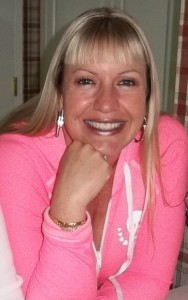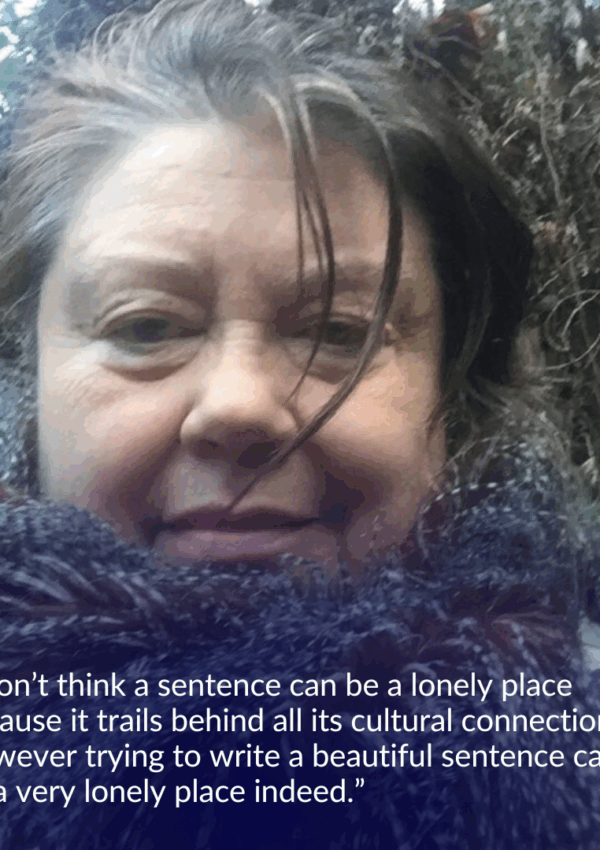An interview by Alicia Cole
 Dawn A. Fuller is a Hungarian-American writer who grew up in the desolate, desperately hot, and nearly-forgotten Imperial Valley. She currently lives in Pasadena, California. When she isn’t writing, she enjoys shameless hours of book collecting and spending time with her best friends—her mom and dad. Dawn’s work has been featured in Adanna Literary Journal, Black Fox Literary Journal, Boyne Berries, and more. Her novel, Tuomb Beoir, is due out in 2019.
Dawn A. Fuller is a Hungarian-American writer who grew up in the desolate, desperately hot, and nearly-forgotten Imperial Valley. She currently lives in Pasadena, California. When she isn’t writing, she enjoys shameless hours of book collecting and spending time with her best friends—her mom and dad. Dawn’s work has been featured in Adanna Literary Journal, Black Fox Literary Journal, Boyne Berries, and more. Her novel, Tuomb Beoir, is due out in 2019.
Black Fox Literary Magazine: How long have you been writing?
Dawn A. Fuller: Since I was young, but I have always been a natural-born oral storyteller. My Hungarian-American heritage provides me with a rich tradition of storytelling, but more so my own family. We have told each other stories that have carried on for generations. I have always loved sitting at the dining room table after dinner listening intently to my mom, auntie, and granny, telling each other stories–even if I didn’t quite understand all that was being said, or about whom it was being said. The stories always sounded exciting. They could be something as simple as what happened at the beach when my mom met my dad, to when my young Grandpa Zoltan traveled by boat to Ellis Island from Budapest in search of a new American life, to my mom and auntie talking about seeing Saturday Night Fever.
BFLM: What drew you to the field?
DAF: Stories piling up inside of me that need/have to be told–far-fetched stories, old stories, new stories, scary stories, sad stories, happy stories. I really can’t rest until they are out, and down on a page. They niggle and nudge me until I write them, and creepily, sometimes, even in the middle of the night.
BFLM: Who are your chief inspirations?
DAF: My family, life experiences, people I have met along the way. I am often drawn to eccentric people and situations. People on the fringe of society always get my undivided attention and inspire many of my characters. I like them best. I am fascinated by particular moments in peoples’ lives that change them forever. As far as inspiring writers, I am in love with Southern authors and stories, strong female writers, and Irish writers. Lee Smith, Olive Ann Burns, William Faulkner, Flannery O’Connor, Harper Lee, John Steinbeck, Mark Twain, Larry McMurtry, Truman Capote, Alice Munro, Alice McDermott, Alice Hoffman, Norman MacLean, Brendan O’Carroll, and Roddy Doyle are just a few of my favorites. I would also have to say, I have been inspired throughout the years by my dear poet friend, Wanda Coleman, an unrepentant “Truth Teller.” Many lessons learned over avocado bacon cheeseburgers and bottles of wine in my tiny kitchen about life and writing that resonates with souls, writing that forces readers to face realities they don’t have the nerve to examine, writing that drips with blood, passion, heartache, joy, and forceful, unrelenting grit.
BFLM: Tell us a bit about A Dollar a Piece.
DAF: This is a very personal story for me. I was interested in exploring two primary themes in A Dollar a Piece. The first being the price/worth of a memory. In A Dollar a Piece, the memories associated with Hearts in Atlantis are both precious and priceless to Ann and Richard. To Martin, Hearts in Atlantis had great financial value, but the process itself of searching for the book over and over, not finding it, then discovering it in a remote used bookstore result in his ultimate goal–absconding with an elusive pirate’s booty from the bottom of the sea. Now, as for Katie, well, she had no regard for Hearts in Atlantis, no memories associated with it, and no reason to place any real value on the book—aside from the obvious reason of wanting to make a quick buck.
The second theme in A Dollar a Piece comes from my great love of book collecting. My Hungarian Uncle and I have been collecting books for years and years now. Some might call it an obsession. Throughout my travels, I have been collecting used books from all over the world. Of course, it all began with a love of reading, then, having this need to read each and every book by a particular author. It eventually moved on to wanting to own specific, rare editions (firsts, UK, etc.). I have to have an old book in my hands—to feel and smell, to devour them whole, and most important, to daydream about who owned the book before me. How many people had owned it before? What were their lives like? What was going on with them when they read the same words I was now reading? Who did they love? What made them sad? Where were they now?
Other minor themes explored in A Dollar a Piece are gluttony, greed, and loss.
BFLM: What is your work process like?
DAF: I have many stories running through my mind at any given time. Some have been rolling around in my head for years. Many come to me when I meet someone whose life-changing “moment” somehow changes me too, just by hearing the story. When the stories start calling me, and the characters start talking, it is then that I sit down to write a piece until the story is told–no matter how short, or how long. They just won’t let me be. Usually, I start with a basic outline, or even a very detailed one, but then, the characters have their own way and kidnap me down a rabbit hole that I didn’t expect to travel down. Essentially, this eliminates the majority of the planned outline, which is then revised, and revised, and revised as the characters and story reveal themselves. Characters’ voices dictate the completion of a piece. The stories’ pathways are always a surprise, even to me. I love editing. I also hate editing.
BFLM: What else are you working on?
DAF: My new novel, Tuomb Beoir, based on the lives of Irish Traveller women in Northern Ireland and Ireland that I have met, interviewed, and have come to adore over the last five years. This book is truly my greatest love and I can’t wait to see it completed. Simultaneously, I am completing a collection of shorts called Departures.
BFLM: If you could choose three books to keep, having to let all the others go, what would they be and why?
DAF: Well, now, just three? I wish I could choose more. There are a number of books that I find imperative to re-read at different stages of my life. When I do, I always learn something new about myself, or life in general. If I were only allowed three (shiver at letting all others go), these would be the three books I couldn’t live without:
Out of Africa and Shadows on the Grass by Isak Denison. A beautiful collection of shorts that are both simple and complicated at the same time. Whenever I read Out of Africa, I am transported body-and-soul to Denison’s coffee plantation in Kenya. I smell the smells, feel the heat rising out of the ground, savor the food, watch the wild animals run by in packs, and listen to Isak’s scratchy, old phonograph on her front porch on a starry summer night. Through Isak Denison (Karen Blixen), I have come to love Africa, although, I have never been there. Good writers can do that for you.
Cannery Row by John Steinbeck. Steinbeck is a master. His characters are real people to me and have become personal, cherished friends. Monterey, California’s Central Coast, Doc and the boys, Lee Chong’s General Store, and even the surprise-party-gone-wrong with all the jumping frogs, are now familiar and comfortable locales and scenes that I often return to when my own life is hard, or my writing has gone flat.
Paddy Clarke Ha Ha Ha by Roddy Doyle. Hands-down, my absolute favorite, favorite book of all-time. I read this book over and over and love it more and more with each read. A ten year-old-boy, speaking in his own voice, navigating life in 60s Dublin—school, home, The Troubles, his parents’ failing marriage, torturing his younger brother, Sinbad, and encounters with the bully from down the road—horrible Kevin—make for an excellent story. Doyle’s unique writing style and supreme use of language and humor—which is sometimes melancholy and even dark—give me a front row seat in Paddy Clarke’s ever-changing world. Paddy Clarke Ha Ha Ha is a perfect recipe of awkward, sad, unsettling, and hilarious. Although fiction, Paddy Clarke is absolute truth telling at its best.
“I jumped on Sinbad’s bottle. Nothing happened. I didn’t do it again. Sometimes when nothing happened it was really getting ready to happen.” – Paddy Clarke Ha Ha Ha
Dawn’s short story Lupe’s Lady appears in Black Fox Issue 11.



Excellent questions and Dawn’s answers were so well spoken and deeply felt. By just reading the interview, it is easy to see why Dawn’s writings touch the reader and we don’t want to put the story down! She is definitely a natural born writer and can see a story in all aspects of life.